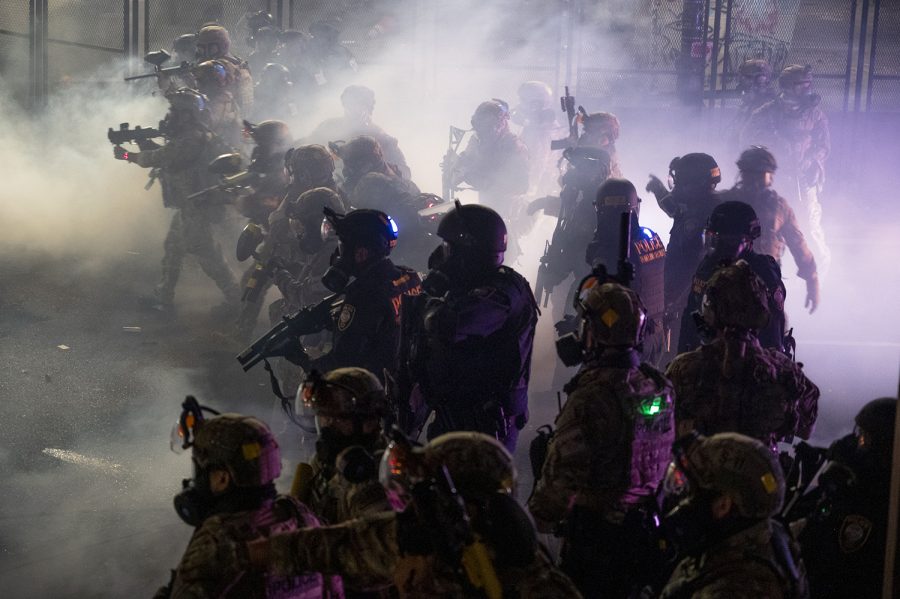Opinion | Black bags are for groceries, not protesters
The events going on in Oregon are a grim display of the government’s distaste for freedom of speech.
Fuerzas federales dispersan a seguidores de Black Lives Matter frente a la Corte Federal Mark O. Hatfield, en Portland, Oregon.
July 29, 2020
Portland, Oregon has become the center for protest coverage due to law enforcement’s callous disregard for the protesters’ lives. With the introduction of federal officers, Portland has now become the quintessential example of what future federal protest responses may look like.
Portland’s protests have been going on for over 50 days, originally sparking due to the police killing of George Floyd. Since the protests began, Portland police have been using less-than-lethal weaponry and teargas — so much so that protesters have been forced to protect themselves with shields made out of pool noodles and blow back gas with leaf blowers.
The use of tear gas was so extreme that the police had to be sued for their overuse of it.
Garrison Davis, a journalist on the ground during the Portland protests, put it best in a recent interview: with YouTuber Vaush: “If you’re not in Portland, you can’t understand. Entire city blocks have been filled with gas you can’t see through — walls of gas.”
And then the feds came.
Unmarked federal troops in Portland have begun to use tear gas and less-than-lethal weapons — some of which can fracture skulls — and at times going so far as to kidnap people off the streets.
Men in camouflage fatigues have jumped out of unmarked vans, grabbed people, and thrown them into their vehicle, covering their eyes before driving off.
Is this what law enforcement is meant to be?
When these protests initially sparked due to systemic injustices, is it the right response to send more heavily armed men with less oversight to do whatever they deem necessary to disperse the protests?
When complaints of police brutality are widespread and rampant, is it correct to split open the heads of protesters?
The answer to these questions is unequivocally “no.” The use of federal troops to this degree has sparked lawsuits by the state of Oregon against multiple federal agencies in an attempt to rein in and ultimately remove the federal troops.
While it seems as though federal troops will be leaving Oregon, this is not the end of federal law enforcement intervening in protests either.
The White House has stated several times about its intention to send troops into other cities with ongoing protests. Chicago, New York City, Detroit, and others are all on the list of places that may see their own unmarked vehicles snatching up people on the streets at night.
Iowans are no stranger to tear gas — it’s been deployed against protesters here before, too. But should federal officers be drawn to Iowa protests, there will be a scale of enforcement against protesters that have not been seen before.
That event may be more likely than most think.
There is a looming eviction crisis in the coming months, with approximately 48 percent of renters in Iowa potentially facing eviction. If no federal aid comes to stop this event that will disproportionately affect people of color, it will only spur these protests further.
It’s almost poetic, in a tragic sense. These protests started due to the government being unwilling to fix systemic issues and they could flare up even higher due to another systemic issue being ignored.
Protesters will not stop because they are met with tear gas. They will not stop because they are met with rubber bullets. They will only stop when the issues at hand are fixed completely.
It doesn’t matter whether it’s a police officer or a federally deployed trooper. The only difference is who will answer for these crimes against the citizens of the United States.
Columns reflect the opinions of the authors and are not necessarily those of the Editorial Board, The Daily Iowan, or other organizations in which the author may be involved.














